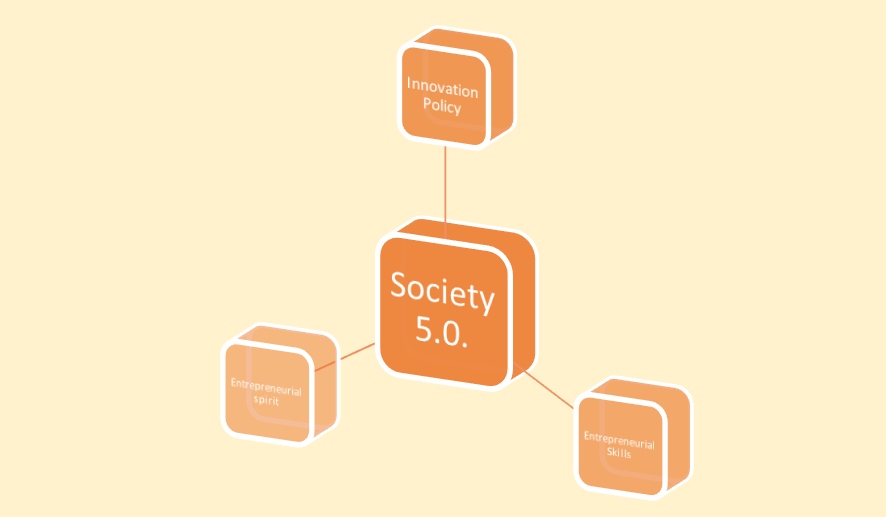Society 5.0. has for finality to strengthen the potential of cyber-physical-social relations in promoting the improvement of the quality of life of all people through a super smart society.
- Society 5.0.
- Digital culture
- Technology
- Social Development
1. What is Society 5.0?
Digital technology is an element increasingly present in contemporary societies, being relevant in the reconfiguration of reference contexts for human action and in the formation of relationships between human and non-human actors.
The concept of Society 5.0 emerged in in Japan, in a strategic national political initiative. According to Hayashi et al. [1], with Society 5.0, Japan seeks “[to] create new values by collaborating and cooperating with several different systems, and plans standardization of data formats, models, system architecture, etc. and development of necessary human resources. In addition, it is expected that enhancements of intellectual properties development, international standardization, IoT system construction technologies, big data analysis technologies, artificial intelligence technologies and so on encourage Japan's competitiveness in “super smart society”” (p. 264).
Society 5.0 is an extremely recent concept as a guide to social development and can have a profound impact on societies at all levels [2], by proposing a deepening of the potential of the individual-technology relationship in promoting the improvement of the quality of life of all people in a sustainability world through a super smart society.
2. Influence
Society 5.0 can have a profound impact on societies at all levels, notably in terms of quality of life and sustainability of society. The reference to the concept of sustainability as a key element for innovation refers to the relevance of the economic, social and environmental dimensions inherent in the innovation process. The economic dimension of sustainability is related to the profit component, to issues such as economic growth, the efficient use of resources and the financial viability of enterprises. The environmental dimension focuses on combating pollution and the efficient and judicious use of natural resources. The social dimension concerns issues such as equal opportunities, justice in the distribution of wealth, ethical behavior, equity and justice.
Mobilizing the framework of Yousefikhah[3] , we consider that to be success, the Society 5.0. needs to integrate several factors dimensions, such as: “1) Innovation Policy (from government side),
2) Entrepreneurial spirit (from Society Side)
3) Entrepreneurial skills (from civil society and institutions)” [3](Yousefikhah, 2017, p. 38) (Figure 1).

Figure 1: Factors that shape the Society 5.0.
However, the “social aspects of technology are normally underestimated in the policy making process” [3] (Yousefikhah, 2017, p. 38), which may greatly limit the political intentions underlying the implementation of Society 5.0.
Note: Text based on Ferreira, C. M., & Serpa, S. (2018). Society 5.0 and Social Development: Contributions to a Discussion. Management and Organizational Studies, 5(4), 26-31. https://doi.org/10.5430/mos.v5n4p26; Serpa, S., & Ferreira, C. M. (2018). Special Issue Society 5.0: Innovation, Uncertainty and Social Sciences. Retrieved August 18, 2018 from https://www.mdpi.com/journal/socsci/special_issues/Society_5.0, and Serpa, S., & Ferreira, C. M. (2019). Society 5.0 and sustainability digital innovations: a social process. Journal of Organizational Culture, Communications and Conflicts, 23(1), 1-14. https://www.abacademies.org/articles/Society-5.0-and-Sustainability-Digital-Innovations-A-Social-Process-1939-4691-23-1-129.pdf
References
- Matthew E. Gladden; Who Will Be the Members of Society 5.0? Towards an Anthropology of Technologically Posthumanized Future Societies. Social Sciences 2019, 8, 148, 10.3390/socsci8050148.
- Hisashi Sasajima; Yoichi Takayanagi; Hirco Kanamaru; Hisanori Hayashi; International standardization for smarter society in the field of measurement, control and automation. 2017 56th Annual Conference of the Society of Instrument and Control Engineers of Japan (SICE) 2017, 10, 263-266, 10.23919/sice.2017.8105723.
- Sara Yousefikhah; Sociology of innovation: Social construction of technology perspective. AD-minister 2017, 1, 31-43, 10.17230/ad-minister.30.2.
